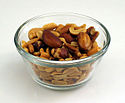Culinary nuts are dry, edible fruits or seeds that usually, but not always, have a high fat content. Nuts are used in a wide variety of edible roles, including in baking, as snacks, and as flavoring. In addition to botanical nuts, fruits and seeds that have a similar appearance and culinary role are considered to be culinary nuts. Non-botanical culinary nuts are divided into three categories: drupes, gymnosperm seeds, and angiosperm seeds. Nuts have a rich history as food. For many indigenous peoples of the Americas, a wide variety of nuts, including acorns, American beech, and others, served as a major source of starch and fat over thousands of years. Similarly, a wide variety of nuts have served as food for Indigenous Australians for many centuries. Other culinary nuts, though known from ancient times, have seen dramatic increases in use in modern times. The most striking such example is the peanut. Its usage was popularized by the work of George Washington Carver, who discovered and popularized many applications of the peanut after employing peanut plants for soil amelioration in fields used to grow cotton. (Full list...)
